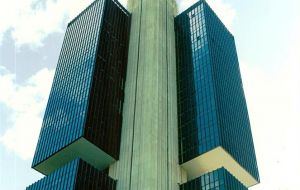MercoPress. South Atlantic News Agency
Brazil raises basic interest to 10,75%; same rate as when Rousseff took office
 The bank is battling to bring inflation down to target range
The bank is battling to bring inflation down to target range Brazil's central bank raised its benchmark interest rate Wednesday to 10.75% from 10.5%, and left the door open for more rate increases while slowing the pace of the hikes. The move continues the bank's yearlong fight against inflation even as rising interest rates and the poor performance of the country's exporters jeopardize already feeble growth in an election year.
The statement accompanying the announcement was little changed from the previous statement, suggesting the bank is prepared to continue to raise the rate, known as the Selic, as necessary. The increase was in line with expectations.
The bank began raising rates in April, when the Selic was at a historic low of 7.25%. At that time, consumer prices were already rising at an annual pace of 6.5%, the upper end of the bank's target range. The bank has now raised the rate at eight consecutive meetings, and by half a point at the previous six meetings.
The inflation rate rose to 6.7% last June and has since fallen, reaching 5.6% in January. The pace of price increases is unlikely to reach the 4.5% center point of the target range any time soon, according to most forecasts, including the government's.
“Continuing the process of adjustment of the basic interest rate, begun in the April 2013 meeting, the Copom unanimously decide to raise the Selic rate 0.25% to 10.75% per annum, with a neutral bias,” the statement said.
The Selic at 10.75% is now at the same level as when President Dilma Rousseff took office in 2011, promising to bring down interest rates.
Inflation is expected to be 6.11% over the next 12 months, according to the central bank's “Focus” survey of local financial institutions' forecasts while GDP is expected to grow only 1.67% this year according to that same survey.
The Copom will release the minutes from Wednesday's meeting on 6 March. Its next meeting is scheduled for April 1 and 2.




Top Comments
Disclaimer & comment rules-

Read all commentsYes, it has taken her and The Liar Mantega to learn what I have always said, that no-one and no country can buck Mr. Market.
Feb 27th, 2014 - 10:41 am 0Dilma thought that the dastardly banks were being hard on the “poor” by refusing them bank loans. But the real reason relatively poor people should not have loans is that they cannot repay them if the economy moves against them. “Sub-prime” ring a bell with anyone.
And Mantega has done his best to ruin the economy.
So, I told you so. The banks knew their market all the while: Dilma needs to keep that lesson to heart.
Commenting for this story is now closed.
If you have a Facebook account, become a fan and comment on our Facebook Page!